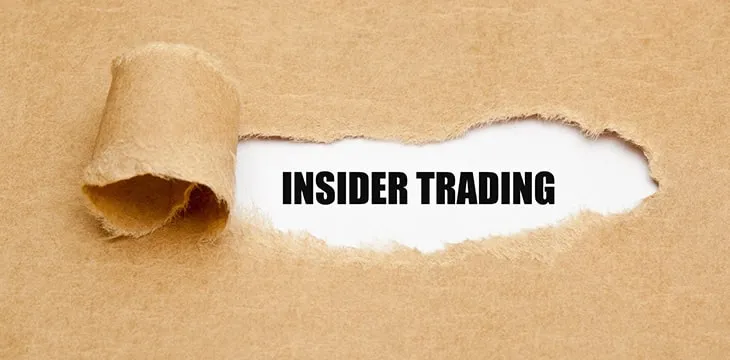|
Getting your Trinity Audio player ready...
|
The U.S. Securities and Exchange Commission (SEC) is concerned about insider trading on digital asset exchanges, a new report has revealed. The watchdog has reportedly sent a letter of inquiry to one of the major exchanges in the country as it seeks to determine what measures are in place to protect unknowing customers.
Fox Business first reported the SEC’s latest move in the digital asset industry at a time when more regulators are getting concerned. Citing a person familiar with the matter, the outlet claimed that in the letter, the SEC wanted to know how the platform identifies and thwarts instances of insider trading facilitated through its network.
The identity of the exchange the SEC is targeting was withheld, but the source claims the watchdog is going after several others as well. Representatives from the top exchanges, including Crypto.com, FTX, and Coinbase (NASDAQ: COIN), all declined to comment, with the SEC taking a similar stance.
The latest probe by the regulator comes as no surprise. Since early May, the market has been rocked by mayhem following the collapse of UST’ unstable’ coin and its sister token LUNA, both developed by Terraform Labs under the stewardship of Do Kwon.
Almost immediately following the collapse of LUNA and UST, which combined had a market cap exceeding $58 billion, SEC chairman Gary Gensler told Bloomberg that the commission was concerned that digital asset exchanges aren’t separating their various sectors of business, such as custody, market making, and trading services well enough to avoid interference.
“Crypto’s got a lot of those challenges— of platforms trading ahead of their customers. In fact, they’re trading against their customers often because they’re market-marking against their customers,” Gensler stated in the Bloomberg interview in early May.
Gensler’s concerns are valid. With minimal oversight over their activities, exchanges in the digital asset space operate with a “make-money-at-any-cost” mentality and care little about their users.
Today, one of the biggest market makers in the industry is Alameda Research, a company founded by Sam Bankman-Fried (SBF), who also happens to be the CEO and founder of FTX, one of the largest exchanges globally. As CoinGeek previously reported, Alameda is deep inside the Tether crime cartel, and as of November last year, it had received nearly a third of all USDT ever printed. SBF was even sued for market manipulation in the past.
What’s more, Alameda is one of the industry’s most prominent investors in token projects. One of the company’s and SBF’s pet projects is Solana, a project that promised to solve all the scaling challenges of Ethereum, but ended up being worse by suffering regular outages. SBF has not shied from promoting Solana any chance he gets and claiming it’s the next Bitcoin.
With all these intricacies in the sector, Jeremy Hogan believes the SEC’s concern about insider trading is not a surprise. The digital currency lawyer at Hogan & Hogan LLP told Fox Business,
“A request for more information from the SEC to crypto exchanges would make sense given the SEC’s recent emphasis on regulating the exchanges, ostensibly in the name of consumer protection,” Hogan stated.
“In the past there have been allegations of insiders buying large amounts of tokens that were going to be listed on an exchange (thereby increasing the price) but which listing was not yet public knowledge, and it’s that sort of trading that the SEC might be forewarning the exchange they need to get control of,” he added.
While it’s not yet been revealed which exchange the SEC has gone after, Coinbase is notorious for insider trading accusations. In the past, it has been observed that whenever a digital currency was set to be listed on the American exchange, it would be purchased en masse days before the announcement and dumped once it shot up following the unveiling.
These allegations were revived recently by some traders with keen eyes who spotted irregular activity on tokens that Coinbase later listed. CEO Brian Armstrong responded in a blog post, admitting that “there is always the possibility that someone inside Coinbase could, wittingly or unwittingly, leak information to outsiders engaging in illegal activity.”
Follow CoinGeek’s Crypto Crime Cartel series, which delves into the stream of groups from BitMEX to Binance, Bitcoin.com, Blockstream, ShapeShift, Coinbase, Ripple,
Ethereum, FTX and Tether—who have co-opted the digital asset revolution and turned the industry into a minefield for naïve (and even experienced) players in the market.

 08-15-2025
08-15-2025 





